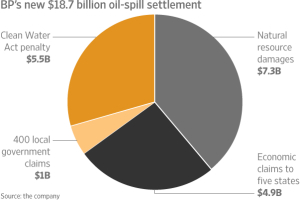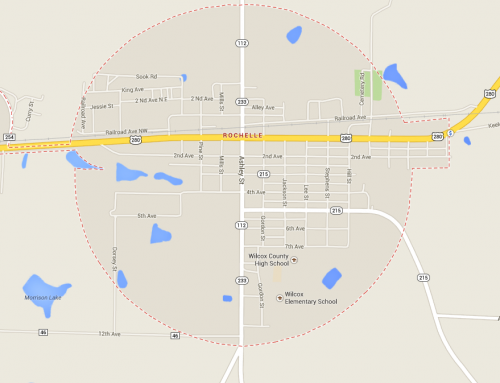Today BP agreed to an $18.7B settlement agreement regarding its role in the 2010 Deepwater Horizon oil spill in the Gulf of Mexico. The settlement effectively ends all federal and state claims against the oil giant. Here is a breakdown of that $18.7B figure:
- $5.5B for violation of the Clean Water Act;
- $7.3B for damage to natural resources;
- $4.9B for state claims (LA, MS, AL, FLA);
- $1.0B in claims by local governments.
This outcome is the largest environmental law settlement in US history.
Benefits of the settlement include an end to the various federal and state cases that have been ongoing for the past five years. Those affected now have greater certainty regarding compensation, and large costal restoration projects can be budgeted.
However, this settlement, like those in any case, short circuits the judicial process. Under the Clean Water Act, one of our country’s most important and powerful environmental laws, it is up to a federal judge to determine the liability of and damages owed by polluters. In this case, Judge Carl Barbier of New Orleans had already ruled that BP was guilty of “gross negligence” for the oil spill (versus simple negligence), and was thus subject to fines of $4,300 per barrel of oil spilled (vs. $1,100/barrel). Based on the government’s findings regarding the amount of oil spilled, BP’s maximum fine under the CWA alone could have been $13.7B.
Under the terms of the settlement announced today, however, BP’s CWA fines are only $5.5B, or approximately 40% of the maximum it could have faced.
Since Judge Barbier had yet to rule on the CWA penalty, BP was probably feeling the heat and fearing a possible $13.7B fine. Therefore, it is likely that BP significantly sweetened its offer to the government, resulting in today’s settlement.
What’s puzzling to me is why the government accepted this settlement. The $5.5B CWA penalty is much closer to what BP would have faced had Judge Barbier not found that the oil giant had acted with gross negligence.
The settlement is also troubling in that it follows the pattern of the government settling with large corporations short of judicial resolution. We have seen this play out time and time again in the context of financial regulators settling fraud cases with Wall St. banks. If the government had been able to pursue these cases for five years, why couldn’t it see them to their logical conclusions? While it may have taken more time, the ultimate fines could have been far greater.
I also worry about moral hazard. Our federal government has some very strong environmental laws. However, when it agrees not to enforce these laws to their full extent, would-be polluters may take greater risks in their operations. Laws are only meaningful when enforced, and sadly, in today’s America, large corporate defendants are treated far better than your average low-level offender. To add a final insult to injury, BP is likely to attempt to deduct over $6B of these penalties from its taxes.

